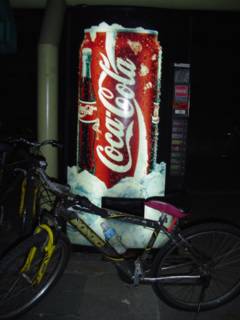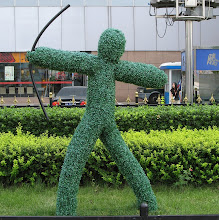Dec 11, 2004
Molecular Self-Assembly
this pages provides top papers, top authors, top institutions, top nations and top journals of self-assembly.
Nanotechnology
this pages gives top papers, top authors, top institutins, and top journals of the nanotechnology.
Dec 10, 2004
two more small thoughts
2. from the sound and lights show in Malacca. The Malaysia was colonized by the Portuguese, the Dutch, the British, and the Japanese in succession. When they seek the independence, they unite all the ethnic groups in Malaysia, which demonstrates again that unite we win, divided we fall.
some small thoughts during the trip
2. A talk with Huong, a Malaysia business man whom I met in Green Hut lodge, reminds me the importance of English. English is a tool to let one be an international guy. He mentioned that there are good scientists in Japan and Germany who know little English. The lack of knowledge of English prevents them from being international.
3. I got lost twice or more times in KL shopping malls, which proves that the key of design shopping mall is to let the guest get lost and spend more time in the mall and hence more likely to buy more things.
4. I use the gesture of Thumb-up very frequently as an end of asking ways or other info in my travel. I learned the gesture from a guy in C1 Eusoff. I think it is a universal gesture for approval, which also turns me from the role of a learner to the role of more or less a judger.
5. Reading local newspaper reminds of the importance of getting a little knowledge of the macroeconomics, while doing the daily purchase make me feel that the microeconomics is also important.
6. I thought about chenyi in my trip. A teacher whose student is greater than her/him is the best teacher.
7. In the morning the 7th Dec, the host of Green Hut Lodge greeted me with “hi, zhe shi wo meng de nanjing ren!” it makes me feel a little proud because I may be the first nanjing ren in Malaysia Hostels
8. I ran, ran and ran, with the last hope of the kind service lady will let me in , and got to the Petronas Twin Tower 15 minutes after the time (4pm) shown on the ticket.
“I know I was late, but...”
“why are u late?”
“I lost my way.”
“do not do this again anywhere.” and she lets me in...
9. Yu tongmao: a man who solely learn from experience and who see college as an absolutely means
small travel tips continued
2. I bought the city map at the night I arrived at Kuala Lumpur, which is after I had found the hostel. Get the city map as early as possible, which make finding the hotel easier.
3. I used the compass throughout my journey. Always equipped with a compass when traveling!!
4. I do not bring an umbrella with me to Malaysia. And luckily, there is no rain in those days. But, next time, get the weather info of the destination and decide whether to bring the umbrella.
5. The Kuala Lumpur is small. All the places of interests are within walking distance. Take a note of the scale of the city map, the KL is 1:12000 and the size of the map is about 2 times the A4 size.
6. I use the single-shoulder bag in the trip, which hurts my shoulders. Next time, use the double-shoulder bag.
7. Muslin food is spicy, very spicy.
8. I bought 4 tins of beer in Malaysia. Every tin costs 7 ringgits. A usual meal will cost less than 5 ringgits. So, beer in Malaysia is much more expensive compare to beer in China.
9. I rent a very bad room in Malacca. The mirror in the room is broken, the bed sheet is not clean, the wall of bathroom which is shared within a floor molded. All of these spoil my mood. Look the room before renting it in the budget hotel.
small general travel tips
2. The Hostel of Green Hut Lodge does not provide toothbrush, toothpaste, soap, towel, slipper or blanket. Other hostel may be the same.
3. The free tourism map of Malacca is not complete. The express bus station is not in the right location of the map, maybe because it is a new express bus station. So asking the way together with the help of map is the best choice in finding ways in a strange city.
4. When I try to locate myself on the map, it is easier to find the rivers, if any, first if the road name is not easy to find on the map. Use the geographic info such as river, mountains, even the position of the sun to help locate myself.
5. I walked from the Malacca express bus station to the downtown, which is a long way. But the next day I found out that there is a “domestic” bus travel between the express bus station and the downtown. Remember to use the convenient public transportation to save my energy when traveling. There should always be bus shuttle between inter-city transportation stations such as airport, railway station or express bus station and the downtown area, if those stations are not in downtown.
6. Note the way of my generalization of the tips—from specific to general. It is a form of thought that I am not used to.
7. I read the local newspaper Star in Kuala Lumpur and the 东方日报 in Malacca. Two pieces of important info: media watchdog: reporters without borders and www.project-syndicate.org. Critical thinking helps me to get more from reading local news, especially the ability to see behind the surface. Keeps alert when reading newspapers, it is completely different from reading science articles in that nearly all the information is subjective.
Dec 2, 2004
the benefit of writing summary or outline of a book
Zhu zhaorui
Besides his travel philosophy, the another crucial idea expressed throughtout the part of his book I read up to now is that the importance of collecting information. He collects information from a variety of sources including dailly notice on the street, newspaper advertisement and internet. And this idea is also influencing me, and I now begin to read newspaper's Classified now.
Nov 26, 2004
small topics that to be enriched
2. The advantages of changing subjects from time to time in a day during the exam-review
3. slow in reaction of daily conversation : my advantage or disadvantage
4. the power of analytical thinking: divide things into pieces will make learning easier.
small simple thoughts
"yealah."--Typical singlish.
small life gains hehe
早五成,午晚七。
前额痛,不可用,每周动。
back up file very wee.
谦虚,谨慎,戒骄,戒躁。
Update Norton.
Nov 25, 2004
simple thought: a way to make a difference
small life experience: a swimming girl
some quotes for the memory of my finished philosophy module
"This is how philosophers should salute each other: 'take your time!' "--L Wittgenstein
"Ask two philosophers what is philosophy, and get three answers. Definitions tend to be either trivial or controversial."
"Philosophy...unintelligible answers to insoluble problems." H Adams
"There is nothing so ridiculous but some philosophers has said it." Cicero
I like the first one most, for it is the one that I have experienced and am going to pratice.
Nov 20, 2004
Poet Robert Frost
Two roads diverged in the wood,
and I took the one less traveled by,
and that has made all the difference.
Making a difference is not so difficult according to Robert, all I need is the courage to choose the road "less traveled by".
Nov 12, 2004
the dialectic thinking

Cicero studied his opponent's case with equal effort or even greater effort. Mill was trained by his father to argue both sides of every question.
I have heard the word "Dialectic" since I was in middle school. It was not until recently that I found its importance in writing as well as in daily life. When I write a critique, the dialectic approach is required in considering whether the article contains important counterargument and hence is balanced or not. In daily life, equipping with dialectic thinking appears to be more important. Today, I apply for a visa to US in order to make a trip to visit my aunt and uncle after my exchange semester is over. Though my uncle, aunt and I had fully prepared for it thinking that the material is convincing enough, my application is denial. The reason, from the consular officer, is "my tie to the Singapore is not strong", and he also gives advice that I'd better apply in China. The case itself is not interesting. What matters here is the feeling of confidence before I applied the visa. Making such argument, I studied my case carefully, but not study the opposite—in what situation that I will be denied for a visa. So there should be no reason for me to be so confident before applying.
Studying the opposite not only matters in daily argument; it is also crucial in self- examination. I am the habitual tendency to consider only the positive side of a case, which may contribute to my optimistic character, and which also prevent me from seeing the fault. Back in home university, I received much more praise than criticism. Praise lead to my pride and sometimes arrogance. I need criticism to see the true self. If such criticism is not able to reach me from the out, I will make myself its source.
what can be generalized from experience

In the last post, I conclude that experience, providing concrete example to life criteria, is important to me. The experience not only serves as an opportunity in which I can practise life criteria; they are also the source of new life criteria. I generalize my experience and make conclusion. I conclude from my personal experience that when weather changes, it is easy for me to get cold and it is the time to take some Vitamin C. But because of various reasons, generalization from personal experience can go too far from being true. I once drink the coffee in the Hall Canteen, and it tastes awful. So I generalized that all the coffee are bad, and I will remain drinking tea. You can imagine how soon I will change my mind. So, what can I generalize from the experience? I think the crucial thing is to find essential reasons. The change of weather results in the decrease of my immune system, and so I am easy to get cold. The decrease of my immune system is the essence of that generalization. However, the bad taste of coffee I had tried is not the essential property of all the coffee, though it is for those offered by my Hall Canteen. So find the essence is key of generalization from personal experience.
the ladder of abstraction

"Semanticist S.I. Hayakawa discussed the idea of an abstraction ladder in which language starts on the ground, so to speak, with an object available to our sense of perception, and moves up to concepts abstracted from, derived from, the concrete source-for example, from a specific cow to livestock to farm assets to assets. He stressed that our powers of abstraction are indispensable. 'The ability to climb to higher and higher levels of abstraction is a distinctively human trait without which none of our philosophical or scientific insights would be possible.' But he cautioned against staying at too high a level of abstraction. "
This passage, from Writing Logically Thinking Critically, reminds me of the importance of richness of personal experience. I used to be very confident of how to lead my life, a little overconfident I think, because I once thought that all the necessary knowledge of life are criteria, such as being honest, being brave, being kind to the old and so on. But as I grow up, I find that if I have not my own experience, those criteria alone are empty. For example, take honesty. It is easy to say I will be honesty to everyone, but sometimes other factors may be more important, like the happiness of patience. More recently, I find I may lie to someone simply because I am tired of explaining again and again what my department is in my home university because in NUS, there is no correspondent department. It is through specific experience that I realize that those criteria alone do not provide reasons strong enough for my action. They may be right, but are so abstracted that they prevents me from fully comprehend what they really mean.
By the way, J.S. Mill also warns that "an opinion of on a point of conduct, not supported by reasons, can only count as one person's preference", which means more of less the same thing.
Nov 11, 2004
firefox
Have u try this new animal-- firefox?
It is really cool!! I like it!!
Nov 8, 2004
when my spirit is low

It is rare for me. I am usually in high spirit which may be due to constant self-appreciation. (Another interesting topic for self-analyzing) But after having today's critical writing tutorial, I feel depressed. I thought I had well prepared for the Critique on the issue of funding a university. But in the class, I was shocked by how narrow my mind is when the teacher mentioned the possible counter-arguments I have never thought about. Not only by narrow-minded, also am I shocked by my lack of skill of handling whole article which requires taking an overall view of the article. I only addressed the fallacies on the sentence level. After filling myself with unhappiness for a while, I met Sharad later this day. He said that this issue of funding a university is under subjects like economics and probably politics, neither of which I am not familiar with. Suddenly, I feel better. I see a way of catching up. I decided to read some stuff on economics and political science before the final exam of critical writing.
criticism and praise
Nov 6, 2004
critical thinking
2. Study the two-sides of the case, and use dialectic approach to dress the difficult situations, especially when dealing with the analogy.
3. For examining the analogy, always think about the emotion expressed by the analogy. And evaluate it whether it is proper to arouse such emotion.
4. Do not dig one pit too deep, that is, not to analyze one fallacy in great detail. Especially in exam, there is a the word limit.
Nov 2, 2004
Science Watch
this website provides "rankings, interviews, and reports on today's most signigicant science", "tracking trends and performance in basic research".
however, the free online version is out-of-date -- one year late.
science websites: Special Topics
as the main page claims, it provides "citation analyses and commentary for selected scientific research areas that have experienced notable recent advances or are of special current interest."
science websites: Science Watch
It provides similar information as in-cites, but a little professional, and so a little bit out-of-date.
science website:in-cites - The Most-Cited Institutions in Chemistry, 1994-2004
This is page of in-cites under the category of institutions.
other categories of in-cites are scientists, papers, institutions, journals, countries and also other viariety of analysis and essays.
as the homepage of the websites claimed, "incites provides a behind-the-scenes" look at the scientists, journals, institutions, nations, and papers..."
sience websites: [ISI Highly Cited Researchers Version 1.1]
China has 13 highly-cited scientist, 10 of whom are in HongKong.
reasons for taking such modules in NUS
Lao shi ling jing men, xiu xing kao ge ren.
The first sentence gives exact explanation of why I take the arts module in Singapore
The second enlighten me on the way of exploring science frontiers.
Oct 31, 2004
the motive for writing this blog
Oct 30, 2004
my innate rebellion and being a leader
the power of example
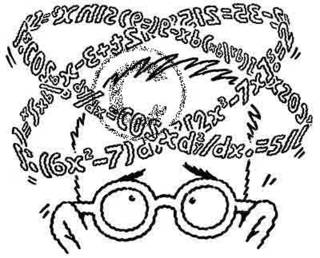
The math textbook in English contains so many examples. I once thought that it is too many. But since these examples are concrete, they help me understand the subject from general abstract definition to concrete vivid things and better the understanding of the abstract terms.
copyright picture from www.cartoonstock.com
Critical thinking

Why is it important to evaluate any information you encounter?
There are also individuals and organizations who, for different reasons, consciously perpetuate lies or partial truths. You simply cannot afford to assume everything you see or hear is accurate and complete.
We should ask questions:
Questioning the information pruducer:
What is the producer's purpose or motive? (Is the information propaganda or an advertisement?)
Is the producer of the information an authority?
Questioning the information itself:
Is the information current?
Is the information complete?
Is there evidence of bias or value-ladened words?
Questioning myself:
Does the information satisfy my needs?
Are there better sources of information elsewhere?
It was not until recently that I discovered how powerful the tool, critical thinking, could be. Its application is not just restricted in evaluation of information as the above paragraph shows. In fact, in daily life when we talk with people, there is a greater need of thinking critically.
Seats
Qualities of Gentleman

Quality of gentleman
He acts kindly from the impulse of his kind heart.
He respects even the prejudices of men whom he believes are honest.
He opposes without bitterness and yields without admitting defeat.
He is never arrogant, never weak.
He bears himself with dignity, but never haughtily.
Too wise to despise trifles, he is too noble to be mastered by them.
To superiors he is respectful without servility; to equals courteous; to inferiors kind.
He commands with mild authority, and asks favors with grace and assurance.
These are excerpts from the Victorian station. Of the special interest is the second one.
grids and concentric circles

Today two old notions of morality, mentioned by my philosophy teacher, came into my mind when I think about the human love. The notions can be explained as grids and concentric circle of morality. For the first one, it is said that we have some moral principle which guild our actions and we apply it equally to everyone, such as punishing the murder. For the latter, it is said that we owe much more to those near us, so sometimes we tend to tolerant more about them. They sometimes contradict each other in some specific situation. (Actually it is related to my first philosophy paper-when should be ok to play favor to those close to us? May be the one out of only two in my lifetime)
And when I think about desire and impulsion and rationality, I found something similar. If the ration is like the grids and the impulsion is like the concentric circle, I will feel better if I rationalize the degree to which I can extend my desire and impulsion, when I express my feelings and acts accordingly.
Oct 29, 2004
Reading Mill
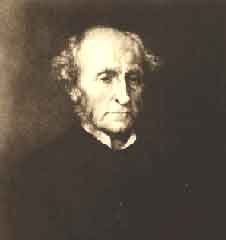
I spent most of my time this week reading J.S. Mill¡'s On Liberty. I thought it was about political science. But then I found that there is many discussions about human nature in general. Some of them are quite deep. I'd like to quote some of them in this post. What's more, one difficulty for me to understand Mill is his 19th century English. It is was not until last a few days of my reading that I found that reading it with reference with a Chinese translated version will make things easier. I have the similar experience when I read science textbooks by myself. To be more specific, since one textbook only offers one version of presenting the subject, we will get better understanding of one subject by referring to several ways of presenting it. We get different approach to it.
Quotations on Mill's On Liberty:
1. Society can and does execute its own mandates: and if it issues wrong mandates instead of right, or any mandates at all in things with which it ought not to meddle, it practices a social tyranny more formidable than many kinds of political oppression, since, though not usually upheld by such extreme penalties, it leaves fewer means of escape, penetrating much more deeply into the details of life, and enslaving the soul itself.
2. No one, indeed, acknowledges to himself that his standard of judgment is his own liking; but an opinion on a point of conduct, not supported by reasons, can only count as one person's preference; and if the reasons, when given, are a mere appeal to a similar preference felt by other people, it is still only many people's liking instead of one.
3. Another grand determining principle of the rules of conduct, both in act and forbearance which have been enforced by law or opinion, has been the servility of mankind towards the supposed preferences or aversions of their temporal masters, or of their gods. This servility though essentially selfish, is not hypocrisy; it gives rise to perfectly genuine sentiments of abhorrence; it made men burn magicians and heretics.
4. That mankind are not infallible; that their truths, for the most part, are only half-truths; that unity of opinion, unless resulting from the fullest and freest comparison of opposite opinions, is not desirable, and diversity not an evil, but a good, until mankind are much more capable than at present of recognizing all sides of the truth, are principles applicable to men's modes of action, not less than to their opinions.
5. But it is the privilege and proper condition of a human being, arrived at the maturity of his faculties, to use and interpret experience in his own way. It is for him to find out what part of recorded experience is properly applicable to his own circumstances and character.
6. He must use observation to see, reasoning and judgment to foresee, activity to gather materials for decision, discrimination to decide, and when he has decided, firmness and self-control to hold to his deliberate decision.
7. Those who have most natural feeling, are always those whose cultivated feelings may be made the strongest. The same strong susceptibilities which make the personal impulses vivid and powerful, are also the source from whence are generated the most passionate love of virtue, and the sternest self-control. It is through the cultivation of these, that society both does its duty and protects its interests: not by rejecting the stuff of which heroes are made, because it knows not how to make them. A person whose desires and impulses are his own-are the expression of his own nature, as it has been developed and modified by his own culture-is said to have a character. One whose desires and impulses are not his own, has no character, no more than a steam-engine has a character.
Oct 26, 2004
Reading newspaper
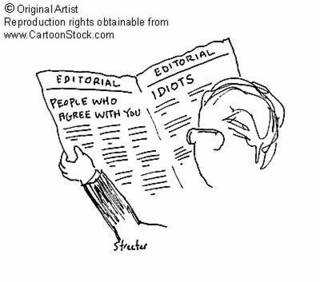
Newspapers are supposed to be in neutral position. But they do not only deal with facts, they present opinions. Sometimes the opinion is hidden between the facts which make it difficult to tell what position they take. We do not read all the newspapers after all. Still more difficult is to identify the value of the society or culture behind the newspaper. To achieve this end, one will not only deal with all the stuff in the newspaper, but also know what important thing is not said in the newspaper.
Every morning, I read The Straight Times, a newspaper widely read in Singapore, and I do not feel anything special about the papers until one day a girl who is in a special education program in NUS, told me some hint. She said that what the Straight Times reports will let you feel that the world is full of danger and uncertainty, but our little island is safe, warm. I think about it, she is probably right. I read from the newspaper that how Chinese government are facing difficulty in steering the economy, how Japan suffers from a recent earthquakes and so on. However, I seldom come across an article that questions the current government and challenge their leaders with hard questions. What I heard is all praise for their great leaders, for how they lead them to the current thrive of S¡ngapore. This is interesting topic of political science. And also recently, an optional reading for my philosophy class is on the political lies, how many kinds of political lies and what function does each achieve. It appears interesting, but unfortunately, I have not done my reading yet. This again relates to something still deeper. It is the values of the society. I look for the definition of values on the web, and find the following stuff on wickipedia. Quite interesting. And I will not be able to write about it today.
Personal and cultural values
Each individual has a set of beliefs and ideas about general concepts that are called values. They describe how much value a person places on various ideas, objects, or beliefs. Societies have values that are shared between many of the participants in that culture.
These values can be grouped into four categories:
Ethics (good, bad, moral, immoral, amoral, right, wrong, permissible, impermissible)
Aesthetics (beautiful, ugly, unbalanced, pleasing)
Doctrine (political, ideological, religious or social beliefs and values)
Inborn (inborn values such as reproduction and survival, a controversial issue)
Oct 25, 2004
Analyzing!!
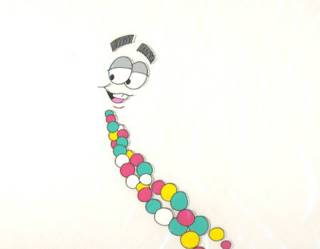
I recently find a way to analyze one self. Perhaps it is to trivial to others, but I consider it as a great discovery to me.
The way is to separate one self to two part, emotional part and the rational part. The emotional part is what I feel. The rational part is what I think. Most of my daily output including talks, writings and actions, are the results of process of one, or both of the two. For example, appreciating arts is basically purely emotional; forming an argument is basically purely rational. These things will not cause many troubles. What I most concerns is the middle part, which involves both sides and the interaction between them.
The perfect example to illustrate how the two function is about love, particularly the love between young guys and girls of my age. While the emotion part functions predominantly at the beginning of the love, deciding who will get shocked and by whom, the rational part will gradually take the fraction from his counterpart until they two reach a balance. I think the balance varies from people to people, and that¡¯s why there is so many kinds of love. For me, the ration part have a larger share.
Oct 23, 2004
slow in reading

My philosophy teacher says we should not read too fast when reading mill, otherwise we will forget what we have read just a couple of minutes ago. but I think I read too slow. And perhaps, because I read too slow, I do not think much when I was reading. And because I do not think much, I alos do not remember what I read just a couple of minutes ago. It is said that we'd better do the rereading. That works well for me.
change in life goal

It seems that I have changed my life-goal. In Nanjing univ where natural science research is her major concern, and where I am filled with all kinds of formulas, being a science professor became my life goal. But when I moved away from home, as an exchange student in NUS, the contents of my life has changed a lot. Here, science stuff counts only a small fraction. In NUS, I read Plato, Descartes, Mill; I listen to concert; I realize the power of critical thinking; I join the talk of Entrepreneurship and I write a lot. Not surprisingly, I tend to believe that one's life-goal is not so simple, just to become somthing or someone. I believe, that my life-goal, rather, is to develop the critical thinking, to read more about whatever possible, to gain understanding of human nature and ethics, to appreciate music and arts, and at the things doing science stuff as long as I like doing it.(Perhaps science will be rice bowl.)
I hope when I come back to my home again, I will be able to keep this mindset, and go on to practice whatever I think is good to me.
Oct 21, 2004
what is wisdom

knowledge v.s. wisdom: in the science of music lecture, when the professor try to explain how numbers are transferred in the cable, he said that "every question is a good question, and I am not saying that all physicists and engineers are smart, and all the arts students are dumb." sometimes, we think we are wiser than others because we have more knowledge, but it is not true. wisedom is something beyond knowledge.
Motivated irrationality

motivated irraionality: the late night Grace want the early morning Grace to get up in the early morning, and she knew that if she put the alarm clock too near her, she will stop the clock and go back to sleep. So, even the late night Grace know that the early morning Grace is going to curse her when getting off the bed, walking across the room to turn down the alarm to be more wake-up, the late night Grace is still going to put the alarm in the opposite end of the room.
or buy one big clock loud enough to wake up the dead.
Oct 18, 2004
the loss of passion
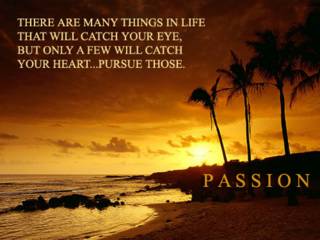
The loss of passion. It seems to me that for all the thing I am going to do, I will at first reason whether it is a good thing to do or not. This is good to me in most cases. However, I therefore, loss the passion of life. It is seems that I should send gifts to my friend, then I send, that I should send a necklace to my girl, then I send. or perhaps, I have not meet the one who can give my real passion yet? perhaps.
Oct 17, 2004
windows XP2

"With the latest update to Microsoft Corp.'s Windows XP operating system, personal computers will soon join parents, bosses, teachers and spouses as a source of nagging in your life. But as Mom always said, it's for your own good."
"You'll get nagged at startup if you're not running an antivirus program or it's out of date. You'll get a warning if a firewall isn't turned on. Other messages pop up when you try to download, install or run software from that sea of malware called the Internet."
well, why I do not see such for-my-own-good nagging on my computer, even though I check my automatic update which is on?
Oct 16, 2004
the Peril of Arrogance
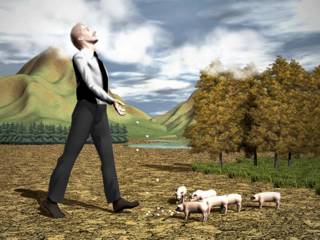
Arrogant person seems to overestimate his/her capacity. I am not an arrogant person, but sometimes over-confident. When I judge other's capacity, I have the tendency, if possible, to compare his/hers to mine. And often, when I thought he/she and I were equally capable of doing certain things, it often turns out that he/she can do better than I do.
Ambition

I have just had a talk with a thoughtful and knowledgable girl. She is in a special sholarship program and takes the toughest modules in NUS. She stired up the inner ambition of mine and wake me up from worries about troublesome daily trivials.
copyright picture from http://www.cartoonstock.com/
Oct 15, 2004
imperfect beings and its language, logic

I am working a propability project about the Bertrand's paradox. while those famous mathematicians think it that there may be a hole in the pinciple of indifference. I think this paradox may just be caused purely by imperfection of the human languange and logic. Some E.T.s may do not have such paradoxes at all, perhaps they are now observing us in some remote area in the universe and wondering how these so-called intellectual beings on the planet E!#$h do not try to find flaws in their mind but to work on how to justify the product of their thoughts.
on dating
Date--An appointment, especially an engagement to go out socially with a member of the opposite sex.
Are the two person on a date necessarily lovers?
I think I have never dated any girls out successfully. But, I have often gone out “socially with a member of the opposite sex”. Anyway, this is not the point here.
I bought a book called dating—clues for the clueless. The book is quite interesting and well-written. Absolutely for guys like me who never actually date out anyone. I once see dating as a weird thing that eats up time unconsciously quickly. I would consider myself to be crazy if I buy such books in China
Still I do not make much progress on it after I arrived in Singapore, where almost everyone around is dating. I could remain stubbornly unmoved even a commonly-sensed attractive girl is aside. I may be too selfish of my time. Even chatting for a long time, I would blame myself. In this sense, I am a workaholic and not a social guy.
I like the words from Higgins in the movie My Fair Lady, "enjoying the philosophical peace of myself". But on the other hand, I do not like to be a confirmed old bachelor as he.
Just a piece of free-thought outside work
"Nothing is obvious."--a post by my philosophy tutor
"Nothing is obvious", I often say in class. Let me explain a little, while I'm stuck in bed with antibiotics and my old Faye Wong records.
Red lights flash, sirens flare, but mostly my eyes glint when someone says that a philosopher is "obviously" wrong. It's a good sign that, hidden from view, there lies a larger battle between their philosophical aims and assumptions. That's why I urge caution when you read an old text. If Meno's paradox of inquiry looks obviously silly to you, don't assume that Plato (or Socrates) is a fool. He must have good reasons for accepting the paradox and talking about past lives. Look elsewhere. Does Plato share our assumptions about knowledge? Is he using these concepts in the same way? Is he solving a different problem? If Descartes' argument from fallible senses seems obviously self-defeating, why doesn't he think so? Look again.
Last night, I came across the same message in an essay by the American philosopher John Rawls:
"I always took it for granted that the writers we were studying were much smarter than I was. if they were not, why was I wasting my time and the students' time by studying them? If I saw a mistake in their arguments, I supposed those writers saw it too and must have dealt with it. But where? I looked for their way out, not mine. Sometimes their way out was historical: in their day the questions need not be raised, or wouldn't arise and so couldn't then be fruitfully discussed. Or there was a part of the text I had overlooked, or had not read. I assumed there were never plain mistakes, not ones that mattered anyway." (with my italics)
Autobiography--the same book I'd recommended extracts from
This problem of obviousness takes an odd twist with Descartes' Meditations. We often find his arguments, rather than his errors, too obvious. "Oh, it's just the Matrix."; We agree too quickly with Descartes' conclusions (even when we don't take them seriously). Or, if we disagree with them, we accept too readily his procedures. We rehearse them carelessly, much like National Day songs we don't quite believe in.
Meditations, that "the least bit of doubt on any point will suffice for complete rejection". What counts here as a legitimate doubt? I emphasized during tutorial the 17th Century obsession with "method". They had nothing like our modern view of science with its official hypothetico-deductive slogans. They were struggling to fit new scientific practices into old Aristotelian models of knowledge. What is science? What is a proof? How do we judge evidence? What is justification?--These were open questions for Descartes and his audience. Nothing should be taken for granted; he is not pointing to any clear-cut sceptical procedure which we can apply, unthinkingly, to our beliefs
Descartes proposes a new model of knowledge based on his standard of absolute certainty. What counts as "absolute"? Does it even make sense to think of an absolute level of certainty? He tried to show us in the rest of the Meditations, drawing on a contrast with the standards of reasonableness and probability. The tricky bit: in the "First Meditation", that new model and its standard are insinuated into the four stages of doubt. The epistemic standard assumed in the Fallible Senses and Dreaming Arguments is the very one they persuade us to adopt. They wouldn't make sense without the very standard they justify. The arguments seem, in a sense, circular; but are they any worse for it? What might this say about Descartes' project? If his arguments work, that is also because we accept (at the same time) the possibility or coherence of that absolute standard. Must we?
Here is a related worry about the "First Meditation". In the painting analogy, Descartes suggests that there are "still simpler and more universal things" which cannot be cast into doubt by dreams. He goes on, quite blithely, to list several metaphysical and mathematical concepts. But are these obvious choices? The Aristotelians, for instance, would deny that "corporeal nature in general", time, place and number are somehow more basic than the things we ordinarily see and touch. How do we decide that they are "the simplest and most general things"? Can we not dream that 2 + 3 = 6? Or that a square has five sides? Why not? What is Descartes up to? What madness is he courting?
Oct 14, 2004
verb, verb, verb
This is post uploaded by email.
The toughest part of English language, as far as I have found, is verbs. Mostly often, choosing the proper verb takes up most of the time I spend in wording.
I think those whose mother language is in English also have such difficulty. So they have the tendency to use short phrases instead of long verbs to express themselves in the daily life. Like want I have just use: "take up"; in stead of "occupy".
Maybe it is a common phenomenon in all the civilization, because our space for memorizing things in brain is limited.
Anyway, perhaps.
Yeah! I have made myself clear!
This a e-mail updated post.
During the group discussion in critical writing class, the most frequent sentence I said is that "yeah! I've made myself clear finally!"
I often find that it is difficult to make my idea clear to those Singaporeans. I spent quite a lot of time on thinking how to present my idea in a clear and precise manner, like drawing a diagram to show the logic connection between the points I made. It is of less frequent for my Chinese classmates to have this understanding difficulty.
Thinking about it twice, I guess that, though part of reason is the culture gap, part of the reason is that I am lack skill of communication. If I have the better skill of communication, my idea in mind will be easier to carry to the others.
Oct 9, 2004
the US presidential debate
This post uploaded by E-mail.
This is my first time to hear so much about the presidential debate of US. I browse the New York Times website on the related issues. I am surprised to find there are so many issues these two men disagree about. I do not know who take his position first, but it seems that on every debatable issue, if one takes a position, the other would take the opposite. It gives me the impression that they do not bother to choose which position to take, but they do bother in explaining to the pubic why they choose the position. It is like that one toss a coin and the head turn out, and then makes his whole effort to explain why the head turns out not tail. It is quite incredible for me that how the American benefit from this kind of election.
Oct 8, 2004
simplicity v.s. the richness of the personal character
I attended a class called science of music. The teacher requires all the students to compose one piece of music in midi form in November, the end of the semester. I am now trying the software he provided to listen and write several notes. I am happily surprised to find out there are so many instruments for me to choose, but sadly at my weakness of describing what emotion the music is carrying, in other words, though I can feel the difference between pieces of music, I couldn't tell in words what exactly I am feeling.
I am trying to figure out why it happens on me. The first reason, I can think of, is that I am not good at expressing feeling even in daily life, nor have I seen the need in my previous life to express my feelings. My previous life do not comprise variety of emotions, simply because it is too simple, to be more specific, from school to home, and then to school. And the role I am playing in my life is son, student, and then student, son again, oh, perhaps often friends and classmates. That is all. So the second reason for my lack of rich emotion is that my life is simple and there is no complicated feeling for me to express.
However, since I see farewell to my parents and the city I was born and went on a journey to explore the world on my own, I began to see the need not only to advance my knowledge, but to explore my realm of emotion also.
The first thing for me to do is to distinguish the different emotions in words, perhaps the music will serve as a good guide.
Oct 7, 2004
logic v.s. knowledge
it is not until recently that I found a big problem in my doctrines: there are too many of them!! too many to remember and what's more, some are even contradicting with each other. for example, be prudent v.s. be brave, when carrying out a new business plan or try something new, these two are always contradicting. Yes, one may say that one can find the balance in between, but how? need another principle, called the principle of the between and adding it to the divine pantheon which left no place for one more? moreover, even if one thinks one find the balance, how can he know there is no other better way to do? so here, principle do not work at all, the same pity for the pure logic who loses his ground!
weep for my logic!
to be continued
Oct 5, 2004
should I talk so much?
but after the talk, I think I may just talked too much about my personal privacy or actually others. on the other hand, I should be specific to be convincing.
what a dilemma!
we are always supposed to fall into such difficult situation, you cannot go up, either can you go down! so sometimes, the best way is to remain silence when you do not really know what to say!!
Sep 2, 2004
Dale Carnegie's way
Aug 30, 2004
Two for today
Every group meeting should have its own goal and purpose, namely, we shall settle something lest we put it off to the next meeting.
Aug 27, 2004
A decision
Here are the two for today.
Select more nutrious books or parts of a books, or even parts of paragraph to read so as to get more through reading the same amount.
Be modest, but not humble to whoever I can learn from.
Aug 19, 2004
a contemplative article by my philosophy teacher
Philosophy: Come for the answers, stay for the questions
[These are the notes for the orientation talk I gave for incoming freshmen. A bit telegraphic, but maybe these notes will give you some sense of the talk, if you missed it.]
The ancient Greek philosopher Aristotle writes: “philosophy begins in wonder.” I’m not sure what the Greek is at this point, but it’s nicely ambiguous. Philosophy is looking at the universe, at anything – at the stars, at human affairs – and saying ‘how wonderful!’ Or, ‘It’s a wonder that they haven’t all killed each other long ago!’ And the next step – which is to say, the first properly philosophical step - is to ask: ‘I wonder what’s really going on here?’ That is the one true philosophical question: ‘what’s really going on?’
Our word ‘philosophy’ comes from the Greek for ‘philias’, love; and ‘sophia’, wisdom. Philosophers are lovers of wisdom. That means: you love the really wonderful stuff. And you wonder how is it, why it is, really.
Now, in case you haven’t noticed, what I just said is much too broad. We are all philosophers, according to this definition. All your teachers here at NUS will be anyway. That's why they have to have Ph.D's - doctor of philosophy, in case you didn't know.
This is connected with the history of the university. The first university was Plato's academy. At first it was all philosophy, but since then some of the bits have moved away from home.
And lots of people outside the university are philosophers, for that matter. Dancers, screenwriters, poets, entrepreneurs, creative folks of all shapes and sizes, believers in this and disbelievers in that. This shows how broad the term can be. And how confused you are likely to be about whether majoring in philosophy is right for you. Philosophy sounds attractively broad, but it isn't reasonable to expect that - as an academic course of study - it can really be everything to everyone who has ever wondered anything.
Doctor of philosophy in philosophy? Sounds redundant. What does it do?
Three words about what our department is like, now that the kids have moved away from home: broad, abstract, argumentative.
We're people helping people refute people. But it's not all as pesky as that makes it sound.
The best way to get an idea of whether you would like this might be to browse the extensive online resources for PH1101EGEM1004, including the archives of this blog. You can read the readings, look at notes, see past assignments, see practice exam questions.
Let me conclude my session today by doing a little philosophy before your very eyes. You are currently in a state of wonder: what should I major in? Obviously I don't know the answer. But let me give you some advice, sing two quotes from famous philosophers to help me along. If I seem like wise advice, maybe you will decide take my module.
"To sum up our discussion of the value of philosophy; philosophy is to be studied, not for the sake of any definite answers to its questions, since no definite answers can, as a rule, be known to be true, but rather for the sake of the questions themselves; because these questions enlarge our conception of what is possible, enrich our intellectual imagination and diminish the dogmatic assurance which closes the mind against speculation; but above all because through the greatness of the universe which philosophy contemplates, the mind also is rendered great, and becomes capable of that union with the universe which constitutes its highest good." - Bertrand Russell
In short: come for the answers, stay for the questions. This is why people find philosophy so annoying. But, come to think of it, this passage - with just a little modification - describes the undergraduate university education you are about to get, no matter what you major in. You are going to study some subject matter, but everyone agrees that the real point is to develop your mind - your critical capacities, your expressive capacities - in some deeper, broader sense. It's just that no one knows what sense that is, exactly.
Think about that: no one knows what you are supposed to be doing here. I'm not kidding. No one does. (How could they?) You ought to regard this peculiar position you are in - floating along in the slipstream of everyone's surprising profound ignorance - as imposing a serious duty, but also as affording wonderful opportunities that will quite probably never come again.
First, the duty: do make a concerted effort to drop any bad study habits you may have picked up along the way.
Second, the opportunity: be yourself.
A traveler who had seen many countries, peoples and several of the earth's continents was asked what attribute he had found in men everywhere. He said: "They tend to be lazy." To others, it seems that he should have said: "They are all scared. They hide themselves behind conventions and opinions." In his heart every man knows quite well that, being unique, he will be in the world only once and that there will be no second chance for his oneness to coalesce from the strangely variegated assortment that he is: he knows it but hides it like a bad conscience - why? From fear of his neighbor, who demands conformity and cloaks himself with it. But what is it that forces the individual to fear his neighbor, to think and act like a member of a herd, and to have no joy in himself? Modesty, perhaps, in a few rare cases. For the majority it is idleness, inertia, in short that propensity for laziness of which the traveler spoke. He is right: men are even lazier than they are fearful, and fear most of all the burdensome nuisance of absolute honesty and nakedness. Artists alone hate this lax procession in borrowed manners and appropriated opinions and they reveal everyone's secret bad conscience, the law that every man is a unique miracle; they dare to show us man as he is, to himself unique in each movement of his muscles, even more, that by being strictly consistent in uniqueness, he is beautiful, and worth regarding, as a work of nature, and never boring. When the great thinker despises human beings, he despises their laziness: for it is on account of their laziness that men seem like manufactured goods, unimportant, and unworthy to be associated with or instructed. Human beings who do not want to belong to the mass need only to stop being comfortable; follow their conscience, which cries out: "Be yourself! All that you are now doing, thinking, and desiring is not really yourself." - F. Nietzsche
Aug 18, 2004
Ha, this is my online home now!
oh,
is there any guest?
I doublt.


